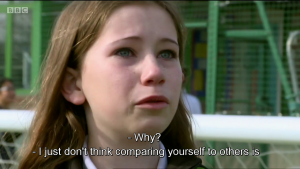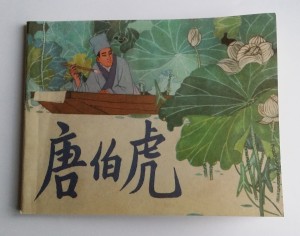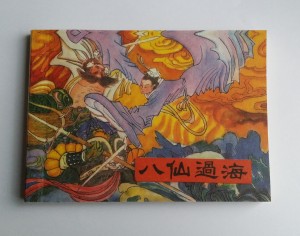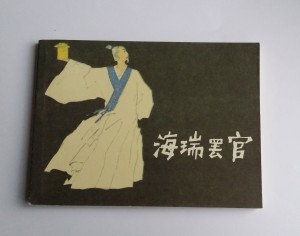下午刚刚看了这个视频,忍不住把它翻译下来。
So I know TED is about a lot of things that are big, but I want to talk to you about something very small. So small, it’s a single word. The word is “misfit.” It’s one of my favorite words, because it’s so literal. I mean, it’s a person who sort of missed fitting in. Or a person who fits in badly. Or this: “a person who is poorly adapted to new situations and environments.” I’m a card-carrying misfit. And I’m here for the other misfits in the room, because I’m never the only one. I’m going to tell you a misfit story.
我知道在TED上应该讲重大的事情,但是我想说的事情,很小,只是一个词,“错位者”。这是我最喜欢的词之一,因为你可以望文知义:一个与周围格格不入,或者难以适应的人。或者,“一个不能很好地适应新的环境和条件的人”。我就是一个不折不扣的错位者,我上来讲,是希望引起其他错位者的共鸣,因为我从来都不是一个人。我来告诉你,我是如何错位的。
0:54 Somewhere in my early 30s, the dream of becoming a writer came right to my doorstep. Actually, it came to my mailbox in the form of a letter that said I’d won a giant literary prize for a short story I had written. The short story was about my life as a competitive swimmer and about my crappy home life, and a little bit about how grief and loss can make you insane. The prize was a trip to New York City to meet big-time editors and agents and other authors. So kind of it was the wannabe writer’s dream, right? You know what I did the day the letter came to my house? Because I’m me, I put the letter on my kitchen table, I poured myself a giant glass of vodka with ice and lime, and I sat there in my underwear for an entire day, just staring at the letter. I was thinking about all the ways I’d already screwed my life up. Who the hell was I to go to New York City and pretend to be a writer? Who was I?
在我三十岁早期的某一天,我的梦想,成为作家的梦想,来敲门了。它以一封信的形式进入我的邮箱,告诉我,说我之前写过的一个短篇故事获得了一个重量级的文学奖。故事讲的是我,一个游泳选手的一生,他糟糕的家庭生活,以及哀痛和殒灭如何使人发狂。奖励是去纽约会见大牌编辑、经纪人和作家。每个未来作家的梦想,对吧?你猜收到信件的当天我干了什么?我与众不同,我给自己倒了一大杯伏特加,加了冰和酸橙,穿着内衣,盯着那封信坐了一整天。我不断地回想自己是如何一步步沦落到如此田地。我是他妈的谁啊,竟然要人模狗样地去纽约,装成一个作家?我是谁啊?
2:06 I’ll tell you. I was a misfit. Like legions of other children, I came from an abusive household that I narrowly escaped with my life. I already had two epically failed marriages underneath my belt. I’d flunked out of college not once but twice and maybe even a third time that I’m not going to tell you about.
我告诉你我是什么人。我是一个错位者。像众多其他孩子一样,我来自一个暴虐的家庭,后来得以侥幸逃出生天。当时已经有过两次狗血般的失败婚姻。大学里面两次弃学,可能还要第三次,原因我现在都没法说。
2:29 (Laughter)
2:31 And I’d done an episode of rehab for drug use. And I’d had two lovely staycations in jail. So I’m on the right stage.
还因为吸毒进过一段戒毒所。还有两次监狱游记。还真是正当时呢。
2:44 (Laughter)
2:47 But the real reason, I think, I was a misfit, is that my daughter died the day she was born, and I hadn’t figured out how to live with that story yet. After my daughter died I also spent a long time homeless, living under an overpass in a kind of profound state of zombie grief and loss that some of us encounter along the way. Maybe all of us, if you live long enough. You know, homeless people are some of our most heroic misfits, because they start out as us. So you see, I’d missed fitting in to just about every category out there: daughter, wife, mother, scholar. And the dream of being a writer was really kind of like a small, sad stone in my throat.
但我想,我觉得错位的真实原因,也是我至今不能释怀的是,我女儿出生当天就去世了。女儿去世之后,我有相当长一段时间无家可归,在立交桥下苟且存活,因为殒灭和哀痛变成了麻木的行尸走肉。在座有人可能有这样的经历。如果活的够长,可能每个人都会遇上。你看,无家可归者是最壮烈的错位者,因为错位只是他们的起点。而我,我在所有能错位的地方都错位了:作为女儿,作为妻子,作为母亲,作为学者。成为一个作家,就是我心中小小的,浇之不灭的梦想。
3:45 It was pretty much in spite of myself that I got on that plane and flew to New York City, where the writers are. Fellow misfits, I can almost see your heads glowing. I can pick you out of a room. At first, you would’ve loved it. You got to choose the three famous writers you wanted to meet, and these guys went and found them for you. You got set up at the Gramercy Park Hotel, where you got to drink Scotch late in the night with cool, smart, swank people. And you got to pretend you were cool and smart and swank, too. And you got to meet a bunch of editors and authors and agents at very, very fancy lunches and dinners. Ask me how fancy.
最后我基本是不情不愿地坐上了飞机,飞到了纽约这个作家的扎堆的地方。错位者们,我几乎能看到你们的脑袋在发光。我能一眼看出谁是错位者。一开始,你肯定会喜欢。你可以选三位你想见的知名作家,然后就有人会帮你找到他们。你被安排在格拉梅西公园酒店,在里面你可以那些又酷又潮又机灵的人们一起喝威士忌喝到夜里。然后你也可以假装很酷很潮很机灵。你还可以见一些编辑、作者和经纪人,跟他们一起吃非常非常高档的午餐或晚餐。你们不问问我有多高级?
4:30 Audience: How fancy?
多高级?
4:33 Lidia Yuknavitch: I’m making a confession: I stole three linen napkins —
我要忏悔,我从三家餐馆
4:37 (Laughter)
(笑声)
4:39 from three different restaurants. And I shoved a menu down my pants.
各顺走了一条亚麻餐巾。还拿走了一套菜单。
4:43 (Laughter)
(笑声)
4:45 I just wanted some keepsakes so that when I got home, I could believe it had really happened to me. You know?
我就是想留下点念想,这样等我回家了,我还能确信这一切是真的发生了。你明白吗?
4:54 The three writers I wanted to meet were Carole Maso, Lynne Tillman and Peggy Phelan. These were not famous, best-selling authors, but to me, they were women-writer titans. Carole Maso wrote the book that later became my art bible. Lynne Tillman gave me permission to believe that there was a chance my stories could be part of the world. And Peggy Phelan reminded me that maybe my brains could be more important than my boobs. They weren’t mainstream women writers, but they were cutting a path through the mainstream with their body stories, I like to think, kind of the way water cut the Grand Canyon.
我当时想见的三位作家是Carole Maso, Lynne Tillman和Peggy Phelan。她们当时并不是非常知名的畅销书作家,但是对我来说,她们是女性作家中的巨人。Carole Maso写了一本书,这本书后来成为了我的艺术宝典。Lynne Tillman让我相信,我的故事也可以是这世界的一部分。而Peggy Phelan提醒我,我的大脑可能要比我的胸前几两更重要。她们都不是主流视野之内的女作家,但我时常想,她们用自己的身体写作,在主流之外开辟出新的路径,就像水流冲刷出大峡谷一样。
5:40 It nearly killed me with joy to hang out with these three over-50-year-old women writers. And the reason it nearly killed me with joy is that I’d never known a joy like that. I’d never been in a room like that. My mother never went to college. And my creative career to that point was a sort of small, sad, stillborn thing. So kind of in those first nights in New York I wanted to die there. I was just like, “Kill me now. I’m good. This is beautiful.” Some of you in the room will understand what happened next.
跟这三位五十多岁的女作家交往的愉悦几乎要耗尽了我。因为我从未有过这样的愉悦。我从未在这样的圈子里呆过。我的母亲从来没有上过大学。而我的创作生涯在此之前一直不足为外人道,随时都要胎死腹中。所以在纽约的第一天晚上,我有点想就此死去。我觉得,“就这样死了吧,我过够了,太美好了”。接下来发生的事情,在座中有些人应该能够理解。
6:15 First, they took me to the offices of Farrar, Straus and Giroux. Farrar, Straus and Giroux was like my mega-dream press. I mean, T.S. Eliot and Flannery O’Connor were published there. The main editor guy sat me down and talked to me for a long time, trying to convince me I had a book in me about my life as a swimmer. You know, like a memoir. The whole time he was talking to me, I sat there smiling and nodding like a numb idiot, with my arms crossed over my chest, while nothing, nothing, nothing came out of my throat. So in the end, he patted me on the shoulder like a swim coach might. And he wished me luck and he gave me some free books and he showed me out the door.
首先,他们带我去了Farrar, Straus和Giroux出版社的办公室。Farrar, Straus和Giroux是我的超级梦想出版社。想想看,T.S. Eliot和Flannery O’Connor在这里出书。主编让我坐下,跟我谈了很长时间,想说服我出一本书,一本关于游泳选手的生活的书,类似一本传记。他跟我说话的时候,我就坐在那里,笑着点头,胳膊交叉在胸前,像个麻木的白痴,什么都没说,一直到最后。最后,他像个游泳教练一样拍了拍我的肩膀,祝我好运,送了我几本书,然后送我出来了。
7:08 Next, they took me to the offices of W.W. Norton, where I was pretty sure I’d be escorted from the building just for wearing Doc Martens. But that didn’t happen. Being at the Norton offices felt like reaching up into the night sky and touching the moon while the stars stitched your name across the cosmos. I mean, that’s how big a deal it was to me. You get it? Their lead editor, Carol Houck Smith, leaned over right in my face with these beady, bright, fierce eyes and said, “Well, send me something then, immediately!” See, now most people, especially TED people, would have run to the mailbox, right? It took me over a decade to even imagine putting something in an envelope and licking a stamp.
接下来他们带我去了W.W. Norton出版社,当时我觉得我肯定会被叉出去,因为我脚上穿了一双Doc Martens。但是并没有。能够进W.W. Norton出版社就好像够到了夜晚的天空,摸到了月亮,而星星在夜空中串成你的名字。这就是我当时的感觉,你明白吗?他们的主编,Carol Houck Smith,凑到我面前,闪光明亮的眼睛凶狠地盯着我说,“那么,发点东西给我们,尽快!”你看,绝大多数人,尤其是TED圈的人,可能马上跑到邮箱前准备寄信,对吧?我花了超过十年的时间来想象把东西放进信封,贴上邮票。
7:59 On the last night, I gave a big reading at the National Poetry Club. And at the end of the reading, Katharine Kidde of Kidde, Hoyt & Picard Literary Agency, walked straight up to me and shook my hand and offered me representation, like, on the spot. I stood there and I kind of went deaf. Has this ever happened to you? And I almost started crying because all the people in the room were dressed so beautifully, and all that came out of my mouth was: “I don’t know. I have to think about it.” And she said, “OK, then,” and walked away. All those open hands out to me, that small, sad stone in my throat …
在最后一个晚上,我在国家诗歌俱乐部朗诵诗歌。朗诵结束时,Kidde, Hoyt & Picard文学社的Katharine Kidde走上前来,跟我握手,当场要做我的代理。我站在那里,好像聋了一样。你们有没有这样的经历?我觉得我几乎要哭出来了,因为每个人都穿的那么漂亮,而最后我说出来的是,“我不知道,我要想想。”她说,“那好吧”,然后就走开了。所有这些都向我,向我心中那小小的块垒张开双臂。
8:50 You see, I’m trying to tell you something about people like me. Misfit people — we don’t always know how to hope or say yes or choose the big thing, even when it’s right in front of us. It’s a shame we carry. It’s the shame of wanting something good. It’s the shame of feeling something good. It’s the shame of not really believing we deserve to be in the room with the people we admire.
你看,我想传达一些像我这样的错位者的特点。错位者,面对太美好的事情,经常不敢奢望,不敢答应,不敢追求,即使这好事就摆在眼前。因为我们身负耻辱,耻于奢望,耻于沉湎于愉悦之中,以及,觉得自己不配与敬仰的人为伍。
9:15 If I could, I’d go back and I’d coach myself. I’d be exactly like those over-50-year-old women who helped me. I’d teach myself how to want things, how to stand up, how to ask for them. I’d say, “You! Yeah, you! You belong in the room, too.” The radiance falls on all of us, and we are nothing without each other. Instead, I flew back to Oregon, and as I watched the evergreens and rain come back into view, I just drank many tiny bottles of airplane “feel sorry for yourself.” I thought about how, if I was a writer, I was some kind of misfit writer. What I’m saying is, I flew back to Oregon without a book deal, without an agent, and with only a headful and heart-ful of memories of having sat so near the beautiful writers. Memory was the only prize I allowed myself.
如果可能,我希望回到过去,像那些帮助过我的五十多岁的女作家一样,指导我自己。我会教自己该如何奢望,如何争取,追求那些美好。我会对她说,“你,就是你,你属于这里。荣光属于这里每一个人,少了任何一个,我们就什么也不是。”然而,我静悄悄地飞回家,当俄勒冈的雨滴和常青树映入眼帘,我已经在飞机上喝了很多“悔恨专用”酒。我在想,我要是个作家,也是个错位的作家。我是说,我从纽约飞回俄勒冈,没有签下一个合同,一个经纪人,只有满满的记忆,记得我曾经离那些迷人的作家们如何得近。记忆是我许给自己的唯一的奖励。
10:16 And yet, at home in the dark, back in my underwear, I could still hear their voices. They said, “Don’t listen to anyone who tries to get you to shut up or change your story.” They said, “Give voice to the story only you know how to tell.” They said, “Sometimes telling the story is the thing that saves your life.”
然后,回到家里,只穿内衣坐在暗处,我还能听到他们的声音在耳边回响。他们说,“不要听信任何让你闭嘴或者改变故事的人”,他们说,“把那些只有你知道的故事讲出来”,他们说,“有时候讲故事能改变人生”。
10:42 Now I am, as you can see, the woman over 50. And I’m a writer. And I’m a mother. And I became a teacher. Guess who my favorite students are. Although it didn’t happen the day that dream letter came through my mailbox, I did write a memoir, called “The Chronology of Water.” In it are the stories of how many times I’ve had to reinvent a self from the ruins of my choices, the stories of how my seeming failures were really just weird-ass portals to something beautiful. All I had to do was give voice to the story.
现在,你能看到,我是一个五十多岁的女人。我是一个作家,一个母亲,还正在成为一个教师。猜猜我最钟爱的学生是谁?虽然没有在我收到信件的当时发生,我后来还是写了一本传记,名字叫做“The Chronology of Water”。其中讲述了我如何从废墟中重建自我,也讲述了为什么说那些挫折其实都是通往人生妙境的通道,不管其面目如何怪异。我所做的,就是讲出这些故事。
11:26 There’s a myth in most cultures about following your dreams. It’s called the hero’s journey. But I prefer a different myth, that’s slightly to the side of that or underneath it. It’s called the misfit’s myth. And it goes like this: even at the moment of your failure, right then, you are beautiful. You don’t know it yet, but you have the ability to reinvent yourself endlessly. That’s your beauty.
很多文化都有寻梦的迷思,叫做英雄历程。我更喜欢一种不同的迷思,比英雄历程更边缘更底层一些,我叫它错位者迷思。它是这样的:即使在你最失败的时候,在彼时彼刻,你就是动人的。你可能不知道,但是你总能够重新塑造自我。这就是你的动人之处。
11:58 You can be a drunk, you can be a survivor of abuse, you can be an ex-con, you can be a homeless person, you can lose all your money or your job or your husband or your wife, or the worst thing of all, a child. You can even lose your marbles. You can be standing dead center in the middle of your failure and still, I’m only here to tell you, you are so beautiful. Your story deserves to be heard, because you, you rare and phenomenal misfit, you new species, are the only one in the room who can tell the story the way only you would. And I’d be listening.
你可能是个醉鬼,可能刚刚逃出虐待,可能刚刚出狱,可能无家可归,可能身无分文,可能没有工作,可能没有伴侣,最糟糕的情况,可能刚刚失去孩子。你甚至可能失去意识,可能正处在一切失意的最低谷,但是,我来这里就是要告诉你,你仍然如此动人,你的故事应该被听到。因为你,你这罕有其匹的错位者,你这新物种,只有你才能用你的方式讲出这故事。而我,会静静地聆听。
12:43 Thank you.
谢谢!
12:45 (Applause)





